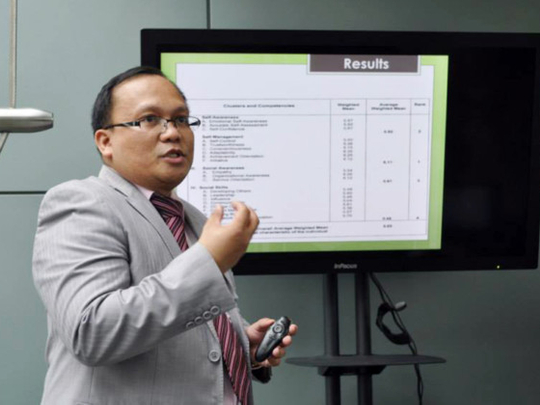
What makes you a better leader at the workplace – academic competency or Emotional Intelligence (EI)? EI wins hands down if we were to refer to an award winning study conducted by a Dubai-based professor. Dr. Rommel Sergio, Chair and Assistant Professor of Human Resource Management Program at the Canadian University in Dubai (CUD) presented a research paper entitled “Emotional Intelligence and Demographic Profile Variables as Predictors of Job Performance among Bank Managers in the Middle East”, at the Harvard University Medical Center, Boston, Massachusetts, USA on May 29, 2013 and his paper was awarded the title of being the best paper in the business track category at Harvard.
The research findings divulge that the bank managers in the Middle East who have been performing well on their jobs possess high emotional intelligence.
Returning from the presentation, Dr Rommel, spoke to Education analysing his paper for the layperson and reiterating the fact that EI played a greater role in determine the success of a bank manager in the Middle East.
What was the purpose and intent of this study?
The study focused on the determinants of job performance such as emotional intelligence and demographic profile variables among 134 bank managers deployed in the private sector of the Middle East countries such as United Arab Emirates, Saudi Arabia, Qatar, and Oman. The demographic profile variables such as age, civil status, educational attainment, and work tenure were ascertained. The study intended to confirm if there was a correlation between and among demographic profile variables, emotional intelligence, and job performance of bank managers.
One of the main findings revealed is the correlation between emotional intelligence and job performance. How would you define emotional intelligence and how does it play out in the job scenario in the UAE?
Operationally, emotional intelligence (EI) is regarded as the soft skills and a learned capability of employees that results in their outstanding performance at work. Essentially, EI plays a role in job settings in UAE. As the focus of my study is the Middle East bank managers who are engaged in customer service, it is indeed vital to for these managers to demonstrate high EI; it requires them an underlying ability in EI fundamentals, specifically, Social Awareness and Relationship Management. If a manager’s EI is high, customer service as an indicator of job performance is predictably high as well.
Better emotional intelligence is directly proportional to higher leadership skills according to your study? Could you elaborate on this concept?
There are four major dimensions of EI according to the framework of Goleman and Boyatzis (2000): Self-awareness, Self-management, Social Awareness, and Relationship Management. Leadership nests in Relationship Management dimension. Our research supports the previous researches across the globe that the higher the EI among managers, the better they perform at work. This is because of the leadership component of EI which is a job factor in a typical job performance among managers.
If emotional intelligence is a learned capability at what stage is it learned best. Can it be really tweaked in adulthood for better performance at job?
Research proves that EI is honed over time. The right sphere to harness EI is through experience. At a very young age, we all interact with people. If we are intra-personally capable, there is always a way to be possess interpersonal skills when we grow old that can help us lead organizations of today. I can say that if you are aware of your strengths and weaknesses and if you are interpersonally adept (leadership skills is under Relationship Management), you are apt to climb the management ladder without much ado. One of the variables that impede the development of EI is when the employee fails to recognize and manage his emotions. Moreover, if an employee resists in discovering his intrapersonal and interpersonal skills, he/she cannot impart his share to accomplish organizational goals.
From your research it seems that amongst some of the important emotional competencies trustworthiness is definitely one which also translates into good social skills and reliability. How important are these qualities to be a good leader at work?
Managing in the new age does not only entail that one shall possess academic excellence or high IQ (intelligence quotient). Trustworthiness as part of EI Self Management dimension points to an important value at work – ethics. If managers are ethical, it will be easy to manage work as people comply according to set of rules.
Your study also points out the need for training specially in enhancing Emotional Intelligence in customer service as just being empathetic is not enough. Can or do companies really hand-pick those who are high on EI and train them to handle their front office or their customer traffic?
Even if EI is still a relatively new concept, I can say that in the western part of the world, EI education and testing have been prevalent. Currently, many explorations are being partaken to magnify the veracity of the established measurement tools and structured programs. We can essentially do the same in GCC/UAE. The survey instruments provide feedback about employees’ competencies related to customer service. This can block customer traffic. Indeed, if one is reflective of his day-to-day activities and has been given the opportunity to be exposed to constant interaction in groups, the higher EI one can possibly have. Being exposed to structured EI training programs can indeed help a person to bring out the best in him.
Q: You have presented a side bar on Personal Competence and Social competence. Can you please explain or elaborate on the tables and how this works in workplace context?
EI framework points to two major divisions: The Self (or Personal Competence) and The Others (or Social Competence). These two divisions have two dimensions each. Each dimension has competencies. The framework simply works by looking into the importance of being aware and being in control of your emotions – from there, you can manage others.
You have quoted a study that says the older you get the more emotionally intelligent you become. Can you please elaborate on this?
In the previous studies, age is a predictor of EI. This pertains to the range of experience that a contemporary knowledge worker has. The more advance in age you are, the higher is the EI as the employee probably learns to adjust, manage, and collaborate with others.. Of course, this entails further studies because some researches contradict this view.
How can this study be effectively used by the corporate sector in the GCC/ UAE to enhance the performance of their workers?
As of now, there are survey instruments that can measure EI and job performance of employees that can be used in the GCC/UAE corporate settings. The survey instruments are valid across culture and can generate specific data that can lead to the creation of structured EI training programs. Once the soft skills training programs are in place, employees can better discover their strengths and can unveil their opportunities for further growth.
Q: You have limited the study to bank managers only, what about the need for EI in other streams of work?
It is true that any research paper has limitations. I have truly concentrated on specific target respondents (bank managers in Middle East). My next research project is related to the possible correlation between EI and work attitudes among call centre agents in the Gulf Cooperation Council and East-Asian countries. Research findings in the western side of the world elucidate correlation between the two variables – let us see if this is also true in the case of the countries that are next in line for such research. I am sure that the results can truly provide baseline data and literature to conduct a study from the aforementioned settings.













